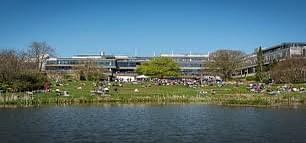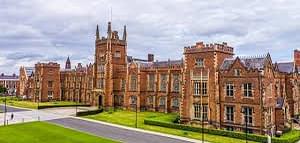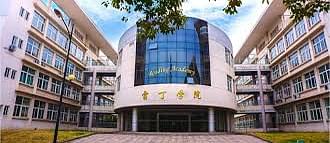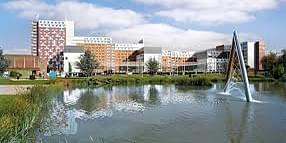$59,410 /Yr
£45,700 /Yr
Features Of the Program :
- You will have clinical experience from the first month of the programme in a variety of locations; hospitals, General Practice and the wider health community
- You’ll learn in small groups of 8-9 using real life clinical examples
- You will gain an excellent understanding of the basic and clinical sciences necessary to be a doctor
- You’ll be studying in a world-leading, internationally-recognised, research-rich environment
- You’ll have the opportunity to obtain an intercalated degree at either Bachelors or Masters level
- Course duration is 5 years.
Course content :
- It develops skills for lifelong learning and the professional attitudes that you will need throughout your medical career. The importance of a multi-professional perspective is a key component.
- The curriculum provides a clinical focus that is patient-centred, forward-thinking and meets the needs of students who want to work as doctors in an increasingly integrated, internationalised health environment. It also includes the whole health community, not just hospitals.
-
This recognises the community role in chronic illness and prevention and provides the social context, giving you a wider perspective and understanding.
Intercalation between years 3 and 4 :
- An intercalated degree provides the opportunity to explore another discipline at degree level, bringing added breadth and depth to your study.
- You may have the opportunity to intercalate and study 120 credits from another Bachelor’s degree (usually the final year) or a one-year Masters degree from a wide range of options available at the University of Exeter.
- Although intercalation means an extra year of study, it can enhance the undergraduate experience by providing additional specialist knowledge and transferable skills which can be a real asset in your future professional life.
Foundation Year
- At the end of the undergraduate programme you will receive your BMBS degree, which is a primary medical qualification (PMQ).
- This entitles you to provisional registration with the General Medical Council. Provisionally registered doctors can only practise in approved Foundation Year 1 posts: the law does not allow provisionally registered doctors to undertake any other type of work.
- To obtain a Foundation Year 1 post you will need to apply during the final year of your undergraduate degree through the UK Foundation Programme Office selection scheme, which allocates these posts to graduates on a competitive basis.
Learning and teaching:
- A patient-centred education means that you will become a clinically skilled graduate with a strong knowledge of contemporary science, an awareness of research and excellent professional behaviour.
- You will benefit from structured small group learning and an intensively supported learning environment and be taught to challenge, stretch, reward and empower yourself.
- On graduation you will be able to approach clinical problems holistically, have excellent communication skills, be empathetic and a good listener.
- You will be confident working in multi-professional teams, be able to seek and appraise the best evidence to inform your practice and be capable of meeting the health care needs of society.
- The first two years of the curriculum are centred around small group learning. In groups of 8 to 10, you’ll work through a series of clinical cases, each lasting two weeks.
- Each tutor guided group meets weekly during the three week study unit to discuss the case(s) provided and then you’ll report back your individual research findings. Between meetings, you’ll undertake research and independent study on all aspects of the case from the biomedical, public health, human science and professional points of view.
- Relevant clinical anatomy is taught using the knowledge and experience of clinicians.
- You will learn to gather information, carry out physical examinations, conduct patient and family interviews, develop your diagnostic skills and perform a variety of practical procedures including injections, venepuncture and basic life support.
- You’ll also develop the ability to interact with patients in a variety of situations.
- In your clinical placements during the first two years, you’ll experience how healthcare is delivered in both the community and hospital. You will normally meet your first patient within the first few weeks of your first year.
- During your placements, you’ll also learn from patients about the breadth of diseases and health problems in a community and the effect of social and environmental factors on disease. This will help you to understand the multi-professional nature of medicine and the importance of the wider healthcare team.
- In your third year you will study pathways in medicine, surgery, general practice and other hospital specialities.
- In year four, these continue with a focus on acute care, the complexities of chronic care, and palliative care/oncology.
- In your final year, you will learn the job of medicine and start to develop your own clinical practice in preparation for graduation. You’ll undertake a series of apprenticeship attachments in NHS hospitals across the South West.
- At this stage you will have developed the personal and learning skills required to analyse and evaluate patients’ conditions and to suggest forms of clinical management. You’ll also take a Student-Selected Elective which may involve clinical or research placements, or a combination of both. Many students take this opportunity to see the practice of medicine in another part of the world.
- Your progress is assessed in relation to your knowledge and your work in clinical practice and you will be provided with continuous feedback, enabling you to identify strengths as well as areas for improvement.
Read More
Important Dates
| Event | Application Date |
|---|---|
| Application Deadline For 2025 Intake | Jan 31, 2025 |
Tuition Fees
| Year | 1st Year Fees |
|---|---|
| Tuition Fees | $59410 (GBP 45700) |
Other Expenses
| Head | Avg Cost Per Year |
|---|---|
| In-campus Standard Room and Board (not living with parent/relative) | $6322 (GBP 4863) |
| Total Cost | $6322 (GBP 4863) |
Eligibility & Entry Requirement
- Students must have a bachelor's degree from a recognized university.
- Students must have an English Proficiency Test score.
Similar Programs
| Program | Important Date | Total Fees | Median Exams Score | Action |
|---|---|---|---|---|
Application Deadline For 2025 Intake (31st Jan 2025) | USD 35,620 /Yr GBP 27,400 /Yr |
| ||
UCAS 2025 Intake Application Deadline (30th Jun 2025) | USD 21,450 /Yr GBP 16,500 /Yr |
|
Scholarship Grants & Financial Aids
| Name | Scholarship Per Student | Level of Study | Type | |
|---|---|---|---|---|
| (ISC)² Women’s Cybersecurity Scholarships | Scholarship per studentVariable Amount | Level Of StudyBachelor | TypeMerit-Based | |
| University of London Scholarships | Scholarship per studentVariable Amount | Level Of StudyApprenticeship | TypeMerit-Based | |
| Collegedunia $150 Scholarship Program | Scholarship per student$ 195/Yr$150 | Level Of StudyBachelor | TypeMerit-Based | |
| University of Nottingham Scholarships | Scholarship per studentVariable Amount | Level Of StudyBachelor | TypeCollege-Specific | |
| Forktip Women’s- Innovation Scholarship | Scholarship per studentVariable Amount | Level Of StudyBachelor | TypeCollege-Specific | |
| Axol Science Scholarship | Scholarship per student$ 2,600/Yr$2,000 | Level Of StudyBachelor | TypeCompany-Sponsored |
Similar Colleges


Robert Gordon University
Aberdeen, Scotland


University of Aberdeen
Aberdeen, Scotland


Aberystwyth University
Aberystwyth, Wales


University of Bath
Bath, England


Cranfield University
Bedford, England


Queen's University Belfast
Belfast, Northern Ireland


Ulster University
Belfast, Northern Ireland


University of Reading
Berkshire, England


Aston University
Birmingham, England


































Comments